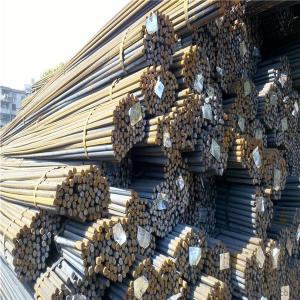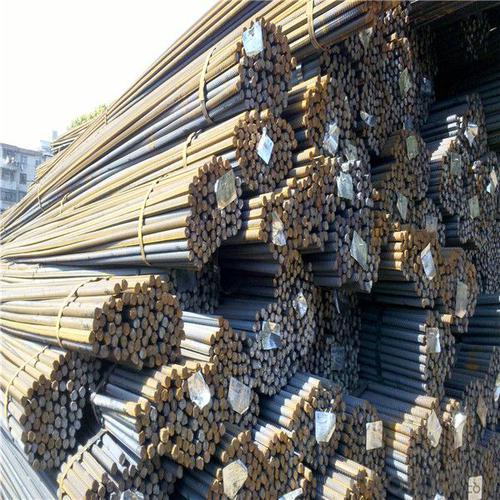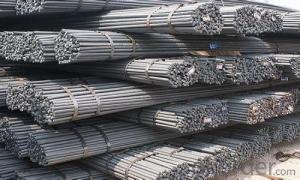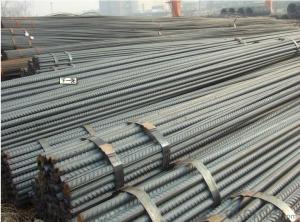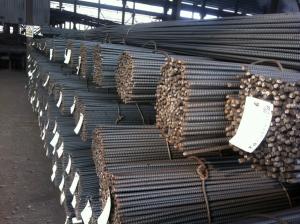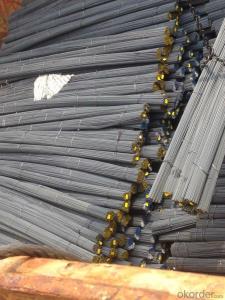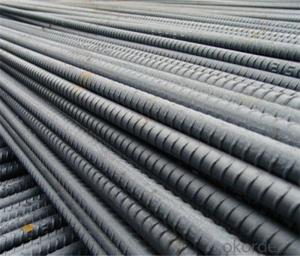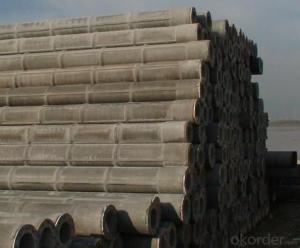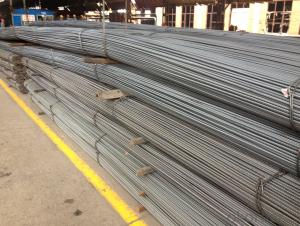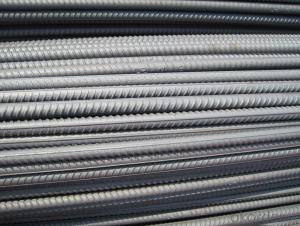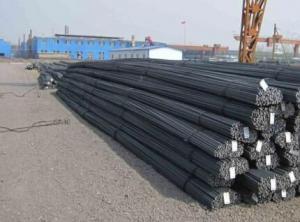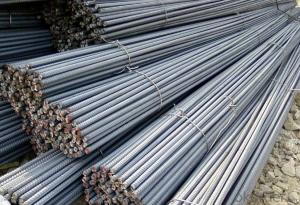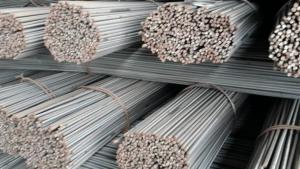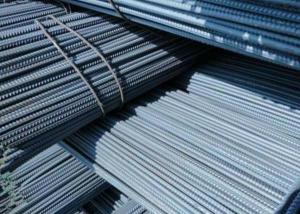Steel deformed bar good quality for constraction
- Loading Port:
- Qingdao
- Payment Terms:
- TT OR LC
- Min Order Qty:
- 1000 m.t.
- Supply Capability:
- 19452 m.t./month
OKorder Service Pledge
OKorder Financial Service
You Might Also Like
Specification
Rebar (short for reinforcing bar), also known as reinforcing steel, reinforcement steel, is a steel bar or mesh of steel wires
used as a tension device in reinforced concrete and reinforced masonry structures to strengthen and hold the concrete
in tension. Rebar's surface is often patterned to form a better bond with the concrete.
Steel rebar is bars of steel commonly used in construction, especially for reinforcing concrete structures such as driveways,
foundations, walls, and columns. These bars come in different sizes and strength grades, and can be smooth or may include
deformations that provide greater adhesion for concrete poured over the bars. When used in poured concrete, the bars are
typically placed in a grid pattern, the concrete poured over them, and then readjusted to maintain the proper shape while the
concrete sets. Steel rebar can be purchased from a number of manufacturers and is often found at construction retailers or large hardware stores.
Our Advantage:
High quality steel products from 1 class mills in China
Reasonable price
Professionalism of the products
On-time delivery
Complete documents and certificates
Sincere service to meet our clients' requirements
Product Description :
Chemical composition (%): | Steel | C | Si | Mn | P | S | Ceq | ||||
HRB335 |
0.25 |
0.80 |
1.60 |
0.045 |
0.045 | 0.52 | |||||
HRB400 | 0.54 | ||||||||||
HRB500 | 0.55 | ||||||||||
Mechanical properties | Steel | Rel/ MPa | Rm/ MPa | A/ % | Agt/ % | ||||||
≥ | |||||||||||
HRB335 | 335 | 455 | 17 |
7.5 | |||||||
HRB400 | 400 | 540 | 16 | ||||||||
HRB500 | 500 | 630 | 15 | ||||||||
Package: | Standard export packing or as customer's request | ||||||||||
Application: | Construction, building, bridge, road. ect | ||||||||||
Payment terms | 1).100% irrevocable L/C at sight. | ||||||||||
Delivery time | 15-30 days after receipt of L/C or deposit by T/T | ||||||||||
Features
1、Pure steel quality, stable chemical contents, small tolerance.
2、Constant Quality, good drawing performance.
3、High dimension accuracy degree, accuracy degree of Level C up to 80%, smooth surface, less scale, easy to be pickled.
4、Automatic bundling with 4 lines by Machine in tidy and good looks
5、Big high quality percentage, small coil percentage, and heavy coil weight for Hard Coil.
6、High sorbitizing percentage.
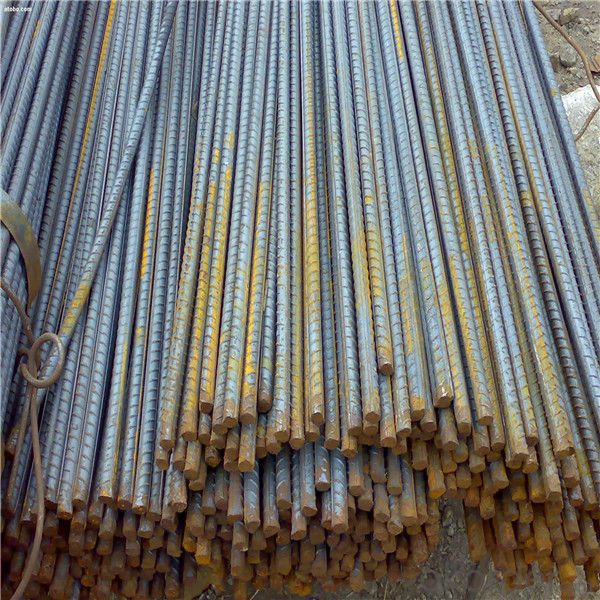
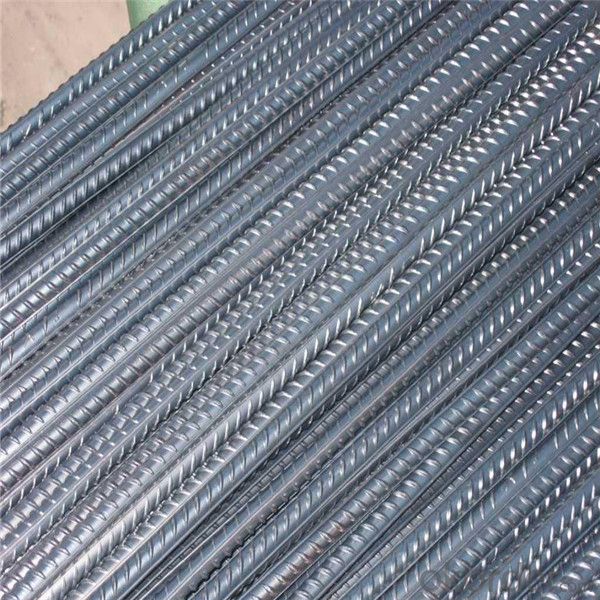
Packing:
In bundles, each bundle weight 3.5 tons. Load by container or by bulk verssel.
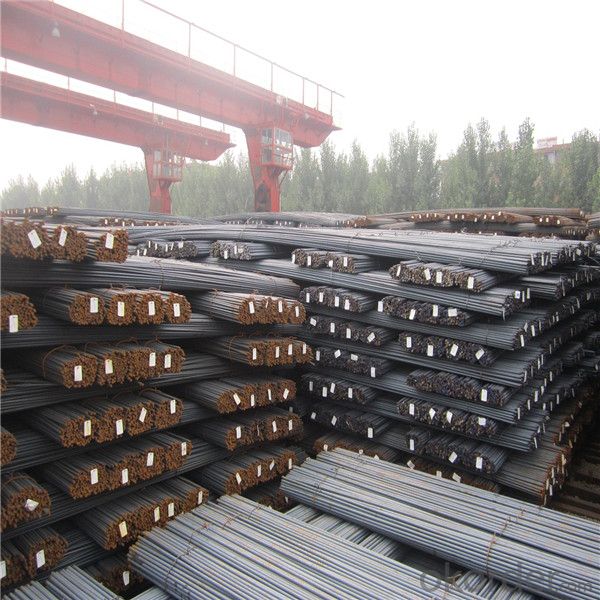
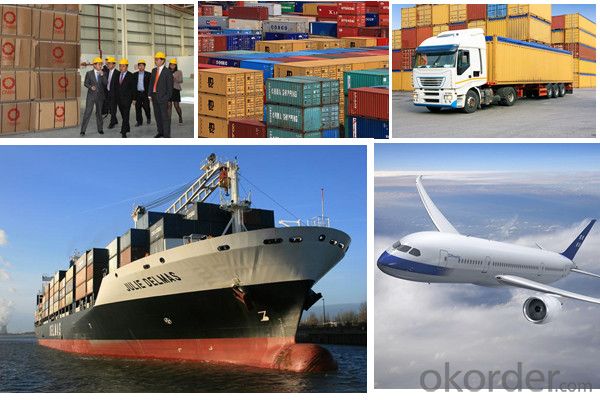
Our service
(1) We cooperate with famous factories with advanced equipment and well trained workers.
(2) We can provide factory price with trading company service.
(3) We continuously work on the improvement of our processes, guaranteeing consistently high standards
of quality to keep none compensation.
(4) We guarantee 24 hours response and 48 hours solution providing service.
(5) We accept small order quantity before formal cooperation.
(6) We deliver the agreed quality at the agreed time, reacting to changes in customer wishes in a flexible way.
(7) Due to our volume and selling power, we have excellent freight rates with shipping lines.
(8) We strive to always be fair and honest in our dealings with customers.
(9) We strive to work together with customers to achieve much more than we can achieve alone.
(10) Through our passion and commitment we aim to be a market leader in all our key markets. To maintain
our position as market leader we must continue to add value in all that we do.
FAQ:
1.Q: What's your MOQ(minimum order quantity)?
A: One full container, mixed acceptable .
2. Q: What's your packing methods?
A: Packed in bundle or bulk ..
3. Q: How can I buy CNBM products in my country?
A:Please send us an inquiry or email ,we will reply to you if there is distributor in your country
4. Q: Can we visit your factory?
A: Warmly welcome. Once we have your schedule, we will arrange the professional sales team to follow up your case.
5. Q: How long does it take to get the product if i place an order?
A:With the process of your requirements,we will pack and deliver in 3-7 days. If it is by sea shipment,it will take 15-45 days depending on different locations
- Q: Are steel rebars suitable for use in wastewater treatment plants?
- Steel rebars are indeed a suitable option for utilization in wastewater treatment plants. The demanding and corrosive surroundings of these facilities often necessitate reinforced concrete structures. Fortunately, steel rebars, frequently employed for concrete reinforcement, provide the strength and durability required for such constructions. Their resistance to corrosion is particularly advantageous in wastewater treatment plants, where the presence of chemicals and corrosive elements is prevalent. Moreover, steel rebars offer exceptional tensile strength, guaranteeing that the concrete structures can endure substantial loads and pressures. All in all, steel rebars prove to be a dependable and suitable selection for incorporation in wastewater treatment plants, as they ensure the facility's longevity and structural integrity.
- Q: How do steel rebars resist fatigue and cyclic loading?
- Steel rebars resist fatigue and cyclic loading due to their high tensile strength and ductility. The presence of reinforcing bars in concrete structures helps to distribute the applied loads more effectively, preventing localized stress concentrations. The steel rebars can absorb and dissipate energy through their ability to deform elastically, which helps to withstand repeated loading cycles without failure. Additionally, the surface properties of rebars can be enhanced through various treatments, such as galvanizing or epoxy coating, which provide extra protection against corrosion and further improve their resistance to fatigue and cyclic loading.
- Q: How do steel rebars prevent concrete structures from spalling?
- Steel rebars prevent concrete structures from spalling by providing reinforcement and increasing the tensile strength of the structure. When concrete undergoes temperature changes or experiences external forces, it tends to expand or contract, leading to cracking and spalling. However, with the presence of steel rebars, these forces are distributed throughout the structure, preventing the concrete from cracking and breaking apart. The rebars act as a support system, holding the concrete together and ensuring its stability and durability, thus preventing spalling.
- Q: How long do steel rebars typically last?
- Steel rebars typically have a long lifespan and can last for several decades. The exact duration of their lifespan depends on various factors, such as the quality of the rebar, the environmental conditions it is exposed to, and the maintenance practices implemented. Generally, steel rebars are designed to be resistant to corrosion, which is one of the main factors that can affect their longevity. However, over time, rebars may experience some corrosion due to exposure to moisture, chemicals, or other corrosive agents. This can potentially reduce their lifespan. Regular inspections, maintenance, and the application of protective coatings can help extend the lifespan of steel rebars. With proper care, steel rebars can typically last 30 to 50 years or even longer.
- Q: What are the different types of steel rebars used in railway bridges?
- There are several types of steel rebars used in railway bridges, including plain carbon steel rebars, epoxy-coated rebars, and stainless steel rebars. Each type of rebar offers unique properties and benefits to ensure the durability and strength of railway bridges.
- Q: What is the effect of corrosion on the strength of steel rebars?
- The effect of corrosion on the strength of steel rebars is detrimental. Corrosion weakens the steel rebars by causing the formation of rust and ultimately leading to the loss of structural integrity. As corrosion progresses, the rebars may become brittle, reducing their load-bearing capacity and increasing the risk of structural failure. Therefore, regular inspection, maintenance, and corrosion prevention measures are crucial to ensure the strength and durability of steel rebars in construction projects.
- Q: Can steel rebars be used in retrofitted structures?
- Yes, steel rebars can be used in retrofitted structures. Steel rebars are commonly used in retrofitting projects to strengthen existing structures and improve their load-bearing capacity. The addition of steel rebars can help reinforce the structure, increase its durability, and prevent further deterioration.
- Q: What is the lifespan of steel rebars in concrete structures?
- The lifespan of steel rebars in concrete structures can vary depending on several factors such as the quality of the steel, the environment in which the structure is located, and the level of maintenance. However, with proper design, construction, and maintenance, steel rebars in concrete structures can typically last for several decades to over a century.
- Q: What is the typical weight of a steel rebar?
- The weight of a steel rebar can vary depending on its diameter and length, resulting in different typical weights. However, in construction projects, the most commonly used steel rebar is usually 20 feet long and has a diameter ranging from 1/2 inch to 1 inch. In terms of weight, this standard size can range from approximately 7.5 pounds to 24 pounds per linear foot. Consequently, a 20-foot steel rebar can weigh anywhere between roughly 150 pounds to 480 pounds. It is worth noting that weight standards for steel rebars may differ between countries, so it is always recommended to refer to local specifications and standards for accurate information.
- Q: What are the different types of steel rebars used in industrial constructions?
- Industrial constructions commonly utilize various types of steel rebars, which play a crucial role in reinforcing concrete structures and imparting strength and durability to the overall construction. The key types of steel rebars frequently employed in industrial constructions are as follows: 1. Mild Steel Rebars, also referred to as black steel rebars, are the most prevalent type utilized in construction. These rebars, crafted from carbon steel, possess a smooth surface. They offer adequate strength and are cost-effective, rendering them suitable for a diverse range of industrial applications. 2. High-strength Deformed Steel Rebars (HSD) exhibit ribs or deformations on their surface, enhancing their bonding with concrete. HSD rebars, composed of carbon steel, undergo thermomechanical treatment to enhance their strength. They are commonly employed in heavy-duty industrial constructions requiring higher strength. 3. Epoxy-coated Rebars are coated with an epoxy resin to safeguard them against corrosion. These rebars find common usage in areas where concrete is exposed to moisture or chemicals, such as bridges and marine structures. The epoxy coating functions as a barrier, averting corrosion and prolonging the structure's lifespan. 4. Galvanized Rebars encompass a layer of zinc coating, bestowing them with corrosion resistance. The zinc coating acts as a sacrificial layer, shielding the steel rebars from rust. These rebars are frequently employed in areas where concrete is exposed to harsh environmental conditions or in coastal regions where the risk of corrosion is elevated. 5. Stainless Steel Rebars, recognized for their exceptional corrosion resistance, are utilized in environments necessitating remarkable durability and resistance to corrosion. They commonly find application in industrial constructions exposed to aggressive chemicals, high humidity, or extreme temperatures. Each type of steel rebar possesses distinct advantages and is suitable for diverse applications based on the specific requirements of the industrial construction project. It is imperative to meticulously consider factors such as strength, corrosion resistance, and cost when selecting the apt type of steel rebar for a particular construction endeavor.
Send your message to us
Steel deformed bar good quality for constraction
- Loading Port:
- Qingdao
- Payment Terms:
- TT OR LC
- Min Order Qty:
- 1000 m.t.
- Supply Capability:
- 19452 m.t./month
OKorder Service Pledge
OKorder Financial Service
Similar products
Hot products
Hot Searches
Related keywords
